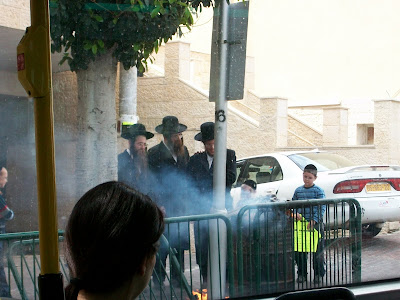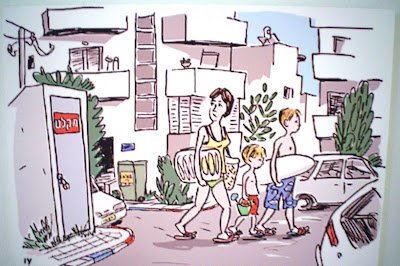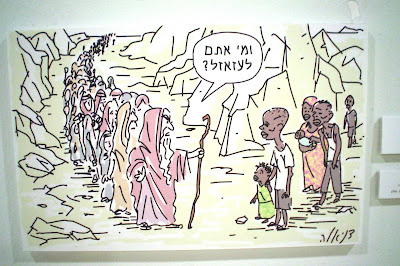BY CARMIA
Amir Benayoun, who sings in Hebrew as well as in Arabic
ADDENDUM: I found the song. It's actually by Dudu Tassa, a Jewish-Israeli artist of Iraqi origin. Enjoy.
 There was a small group of counter-demonstrators, mostly clad in knitted skullcaps.
There was a small group of counter-demonstrators, mostly clad in knitted skullcaps. Representatives from the self-defined Palestinian gay women's group Aswat were also present. Here, one of the members is being interviewed.
Representatives from the self-defined Palestinian gay women's group Aswat were also present. Here, one of the members is being interviewed.

 I came across this store on Allenby Street in Tel Aviv. The sign on the right-hand sign reads, "Keep and remember the Sabbath day holy (because it is a source of blessing)". On the left-hand side, "Viagra pills may be obtained here," and below the sign, a row of bongs disguised as "air fresheners".
I came across this store on Allenby Street in Tel Aviv. The sign on the right-hand sign reads, "Keep and remember the Sabbath day holy (because it is a source of blessing)". On the left-hand side, "Viagra pills may be obtained here," and below the sign, a row of bongs disguised as "air fresheners".





 Eran Wolkowski (July 2006) displays the absurdity of the Second Lebanon War, when residents of northern Israel were under fire or had fled south, while life in Tel Aviv went on as usual. The mother, carrying beach equipment, looks at the מקלט - bomb shelter - which is locked and unused. Tel Avivians are often criticized for "living in a bubble."
Eran Wolkowski (July 2006) displays the absurdity of the Second Lebanon War, when residents of northern Israel were under fire or had fled south, while life in Tel Aviv went on as usual. The mother, carrying beach equipment, looks at the מקלט - bomb shelter - which is locked and unused. Tel Avivians are often criticized for "living in a bubble." Israeli teachers are known to receive pitiful salaries. Pointing to the person next to him, the homeless man tells the woman dropping the coin in his cup, "He intends to become a teacher, so he's doing his internship with me" (Shlomo Cohen, 2007). This was also the year that teachers went on strike for over two months.
Israeli teachers are known to receive pitiful salaries. Pointing to the person next to him, the homeless man tells the woman dropping the coin in his cup, "He intends to become a teacher, so he's doing his internship with me" (Shlomo Cohen, 2007). This was also the year that teachers went on strike for over two months. 

 while I was told that this cheese is the only "yellow" goat cheese (גבינה צהובה) in existence! I was urged to take a picture of it.
while I was told that this cheese is the only "yellow" goat cheese (גבינה צהובה) in existence! I was urged to take a picture of it.


